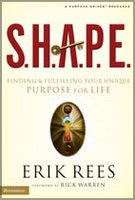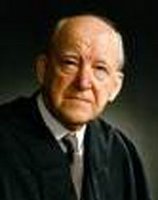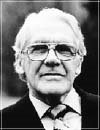
It's important to get an idea of where leaders like Brian McLaren in the Emergent Church are coming from so you can identify the confusion, ambiguity, and unbiblical perspectives of such leaders. Especially when you think of the fact that so many evangelical pastors and leaders seem to view Brian McLaren as "one of their own".
Take some time to read through these quotes and comments of his and let me know if you agree with my assessment of Brian McLaren as a false teacher and/or prophet....
~~~~~~~~~~~~~~~~~~~~~~~~~~~~~~~~~~~~~~~~~
"What if there are thousands of John Calvins out there....
what if God decided to make a lot of them gay?"
––Brian McLaren, Lecture at Princeton Theological Seminary, Nov. 2005
~~~
Brian McLaren's response when asked about gay marriage:
"You know what, the thing that breaks my heart is that there's no way I can answer it without hurting someone on either side."
––Brian McLaren, Time magazine interview, February 2005
~~~
"I hesitate in answering "the homosexual question" not because I'm a cowardly flip-flopper who wants to tickle ears, but because I am a pastor, and pastors have learned from Jesus that there is more to answering a question than being right or even honest: we must also be . . . pastoral. That means understanding the question beneath the question, the need or fear or hope or assumption that motivates the question."
--Brian McLaren on the Homosexual Question, Out of Ur, Jan. 2006
~~~
"Frankly, many of us don't know what we should think about homosexuality. We've heard all sides but no position has yet won our confidence so that we can say "it seems good to the Holy Spirit and us."
--Brian McLaren on the Homosexual Question, Out of Ur, Jan. 2006
~~~
Brian McLaren's view on how we can “solve” the homosexuality issue within Christianity: No one is allowed to talk about it unless they have enough points:
"10 if you have considered and studied the relevant biblical passages
10 if you have actually read the six passages about homosexuality in the bible
20 if you have read other passages that might affect the way you read those six passages
5 if you have read one or more books that reinforce the position you already hold
25 if you have read one or more books arguing the opposite position
10 if you have spent three hours reading websites showing a variety of views
50 for every friend you have who’s been through an ex-gay ministry
50 for every friend who’s been through an ex-gay ministry that didn’t work
50 for every friend who’s gay and in a long-term committed relationship
50 for every friend who’s gay and not in a committed relationship
50 for every parent you’ve listened to whose child is gay
When you have 3,000 points, you can speak on the issue."
--Brian McLaren, Generous Orthodoxy Conference: The Gay Forum, 2005
~~~
"
I don't think we've got the gospel right yet. What does it mean to be 'saved'?.... I don't think the liberals have it right. But I don't think we have it right either. None of us has arrived at orthodoxy."
––Brian McLaren, The Emergent Mystique, Christianity Today, 2004
~~~
"Tony [Campolo] and I might disagree on the details, but I think we are both trying to find an alternative to both traditional Universalism and the narrow, exclusivist understanding of hell [that unless you explicitly accept and follow Jesus, you are excluded from eternal life with God and destined for hell]."
--Brian McLaren’s Inferno 2, Out of Ur, May 2006
~~~
"we should consider the possibility that many, and perhaps even all of Jesus’ hell-fire or end-of-the-universe statements refer not to postmortem judgment but to the very historic consequences of rejecting his kingdom message of reconciliation and peacemaking."
--Brian McLaren’s Inferno 3, Out of Ur, May 2006
~~~
"The language of hell, in my view, like the language of biblical prophecy in general, is not intended to provide literal or detailed fortune-telling or prognostication about the hereafter, nor is it intended to satisfy intellectual curiosity, but rather it is intended to motivate us in the here and now to realize our ultimate accountability to a God of mercy and justice and in that light to rethink everything and to seek first the kingdom and justice of God."
––Brian McLaren, The Last Word and the Word After That, pgs.188-189
~~~
"Isn’t hell such a grave ‘bottom line’ that it devalues all other values? It so emphasizes the importance of life after death that it can unintentionally trivialize life before death. No wonder many people feel that ‘accepting Jesus as a personal Savior’ could make them a worse person — more self-centered and less concerned about justice on earth because of a preoccupation with forgiveness in heaven. Again, although I believe in Jesus as my personal savior, I am not a Christian for that reason. I am a Christian because I believe that Jesus is the Savior of the whole world."
––Brian McLaren, A Generous Orthodoxy, p. 100
~~~
"The church has been preoccupied with the question, "What happens to your soul after you die?" As if the reason for Jesus coming can be summed up in, "Jesus is trying to help get more souls into heaven, as opposed to hell, after they die." I just think a fair reading of the Gospels blows that out of the water. I don't think that the entire message and life of Jesus can be boiled down to that bottom line."
—Brian McLaren, from the PBS special on the Emerging Church
~~~
"
What if Jesus' secret message reveals a secret plan?".... What if he didn't come to start a new religion--but rather came to start a political, social, religious, artistic, economic, intellectual, and spiritual revolution that would give birth to a new world?"
––Brian McLaren, The Secret Message of Jesus, p. 4
~~~
"Ask me if Christianity (my version of it, yours, the Pope's, whoever's) is orthodox, meaning true, and here's my honest answer: a little, but not yet. Assuming by Christianity you mean the Christian understanding of the world and God, Christian opinions on soul, text, and culture I'd have to say that we probably have a couple of things right, but a lot of things wrong, and even more spreads before us unseen and unimagined. But at least our eyes are open! To be a Christian in a generously orthodox way is not to claim to have the truth captured, stuffed, and mounted on the wall."
––Brian McLaren, A Generous Orthodoxy, p. 293
~~~
"...many Hindus are willing to consider Jesus as a legitimate manifestation of the divine... many Buddhists see Jesus as one of humanity’s most enlightened people.... A shared reappraisal of Jesus’ message could provide a unique space or common ground for urgently needed religious dialogue—and it doesn’t seem an exaggeration to say that the future of our planet may depend on such dialogue. This reappraisal of Jesus’ message may be the only project capable of saving a number of religions."
––Brian McLaren, The Secret Message of Jesus, p. 7
~~~
Brian McLaren says of Alan Jones’ book Reimagining Christianity:
“....
Alan Jones is a pioneer in reimagining a Christian faith that emerges from authentic spirituality. His work stimulates and encourages me deeply.” (Brian McLaren's comments on the back flap of Alan Jones' book Reimagining Christianity where Alan Jones states the following about the Christ's crucifixion: "
The Church's fixation on the death of Jesus as the universal saving act must end, and the place of the cross must be reimagined in Christian faith. Why? Because of the cult of suffering and the vindictive God behind it." (p. 132)
"The other thread of just criticism addresses the suggestion implicit in the cross that Jesus' sacrifice was to appease an angry god. Penal substitution [the Cross] was the name of this vile doctrine." (p. 168)
~~~
Brian McLaren's endorsement of Steve Chalke and Alan Mann's book "The Lost Message of Jesus":
“Steve Chalke's new book [The Lost Message of Jesus] could help save Jesus from Christianity. That's a strange way of putting it, I know. Not that the real Jesus needs saving. But when one contrasts the vital portrait of Jesus painted by Steve with the tense caricature drawn so often by modern Christianity, one can't help but feeling the ‘Jesus’ of modern Christianity is in trouble.
The Jesus introduced by Steve in these pages sounds like someone who can truly save us from our trouble”
In this book the authors refer to Christ's crucifixion on the cross as "a form of cosmic child abuse." Brian McLaren endorses this book.
~~~
"At first glance, Dorothy is all wrong as a model of leadership. She is the wrong gender (female) and the wrong age (young). Rather than being a person with all the answers, who knows what's up and where to go and what's what, she is herself lost, a seeker, often bewildered, and vulnerable. These characteristics would disqualify her from modern leadership.
But they serve as her best credentials for postmodern leadership."
--Brian McLaren, Dorothy on Leadership. Rev. Magazine, Nov/Dec 2000
~~~
“Scripture is something God had ‘let be,’ and so it is at once God’s creation
and the creation of the dozens of people and communities and cultures who produced it.”
––Brian McLaren, A Generous Orthodoxy, p. 162
~~~
"Perhaps our ‘inward-turned, individual-salvation-oriented, un-adapted Christianity’ is a colossal and tragic misunderstanding, and perhaps we need to listen again for the true song of salvation, which is ‘good news to all creation.’ So perhaps it’s best to suspend what, if anything, you ‘know’ about what it means to call Jesus ‘Savior’ and to give the matter of salvation some fresh attention. Let’s start simply. In the Bible, save means ‘rescue’ or ‘heal’. It emphatically does not mean ‘save from hell’ or ‘give eternal life after death,’ as many preachers seem to imply in sermon after sermon. Rather its meaning varies from passage to passage, but in general, in any context, save means ‘get out of trouble.’ The trouble could be sickness, war, political intrigue, oppression, poverty, imprisonment, or any kind of danger or evil."
––Brian McLaren, A Generous Orthodoxy, p. 93
~~~
"How do you know if something is true?...First, you engage in spiritual practices like prayer, Bible reading, forgiveness, and service. Then you see what happens; you remain open to experience. Finally, you report your experience to others in the field of spirituality for their discernment, to see if they confirm your findings or not."
––Brian McLaren, A Generous Orthodoxy, p. 199
~~~
“The church latched on to that old doctrine of original sin like a dog to a stick, and before you knew it, the whole gospel got twisted around it. Instead of being God’s big message of saving love for the whole world, the gospel became a little bit of secret information on how to solve the pesky legal problem of original sin.”
--Brian McLaren, The Last Word and the Word After That, p.134
~~~
“The Christian faith, I am proposing, should become (in the name of Jesus Christ) a welcome friend to other religions of the world, not a threat”
--Brian McLaren, A Generous Orthodoxy McLaren, p.254
~~~
“This is how I feel when I’m offered a choice between the roads of exclusivism (only confessing Christians go to heaven), universalism (everyone goes to heaven), and inclusivism (Christians go to heaven, plus at least some others). Each road takes you somewhere, to a place with some advantages and disadvantages, but none of them is the road of my missional calling: blessed in this life to be a blessing to everyone on earth.”
--Brian McLaren, A Generous Orthodoxy McLaren, p. 113
~~~
“Western Christianity has (for the last few centuries anyway) said relatively little about mindfulness and meditative practices, about which Zen Buddhism has said much. To talk about different things is not to contradict one another; it is, rather, to have much to offer one another, on occasion at least.”
---Brian McLaren, A Generous Orthodoxy, p. 225
~~~
"I must add, though, that I don't believe making disciples must equal making adherents to the Christian religion. It may be advisable in many circumstances to
help people become followers of Jesus and remain within their Buddhist, Hindu, or Jewish contexts."
---Brian McLaren, A Generous Orthodoxy, p. 260
~~~
"I felt that every tree, every blade of grass, and every pool of water become especially eloquent with God’s grandeur. Somehow they seemed to become transparent—or perhaps translucent is the better word—because each thing in its particularity was still utterly visible and unspeakably important . . . These specific, concrete things became translucent in the sense that a powerful, indescribable, invisible light seemed to shine through. . . . It was the exuberant joy of simply seeing these masterpieces of God’s creation…and knowing myself to be among them. It was to be one of them, and to feel and know that “we”—all of these creatures, molecules, and phenomena—were together known and loved by God, who embraced us all into the ultimate “We.”"
---Brian McLaren, A Generous Orthodoxy, p. 178
~~~
"I am a Christian because I believe that, in all these ways, Jesus is saving the world. By “world” I mean planet Earth and all life on it, because left to ourselves, un-judged, un-forgiven, and un-taught, we will certainly destroy this planet and its residents. And by “the world” I specifically mean human history, because again, it was and is in danger, grave danger, ultimate danger, self-imposed danger, and I don’t believe anyone else can rescue it.”
---Brian McLaren, A Generous Orthodoxy, p. 97
~~~
I will probably need to do a part 2 since Brian McLaren has a lot on his mind and feels he needs to express it to so many.
One of the things I was wondering about when researching through these comments of McLaren's is--doesn't a true christian cherish and appreciate God
even more because of such doctrines as the sovereignty of God, his holiness and his unfathomable richness of his truth (Romans 11: 33-34)? Don't those doctrines, and many others cause his children to humble themselves more and trust his Word to a greater degree like the writer of Psalm 119 did? Why does McLaren decide to change the meaning of scripture simply because it doesn't fit into his educated brilliant intellectual perspective? Why does Brian McLaren think he has to adjust his theology to fit his life experience? Shouldn't our life experience be perceived through the light of His holy Word rather than his Word being interpreted through an individual's personal viewpoint?
-KTO
 Alas! how many young converts have made shipwreck against such churches. Instead of being a harbor of delight to them, they have proved false lights, alluring them to destruction. Isn’t it time for us to get down on our faces before God and cry mightily to Him to forgive us our sins. The quicker we own it the better. You may be invited to a party, and it may be made up of church members, and what will be the conversation? Oh, I got so sick of such parties that I left years ago; I would not think of spending a night that way; it is a waste of time; there is hardly a chance to say a word for the Master. If you talk of a personal Christ, your company becomes offensive; they don’t like it; they want you to talk about the world, about a popular minister, a popular church, a good organ, a good choir, and they say, "Oh, we have a grand organ, and a superb choir," and all that, and it suits them; but that don’t warm the Christian heart. When you speak of a risen Christ and a personal Savior, they don’t like it; the fact is, the world has come into the church and taken possession of it, and what we want to do is to wake up and ask God to forgive us for ‘Grieving the Spirit."
Alas! how many young converts have made shipwreck against such churches. Instead of being a harbor of delight to them, they have proved false lights, alluring them to destruction. Isn’t it time for us to get down on our faces before God and cry mightily to Him to forgive us our sins. The quicker we own it the better. You may be invited to a party, and it may be made up of church members, and what will be the conversation? Oh, I got so sick of such parties that I left years ago; I would not think of spending a night that way; it is a waste of time; there is hardly a chance to say a word for the Master. If you talk of a personal Christ, your company becomes offensive; they don’t like it; they want you to talk about the world, about a popular minister, a popular church, a good organ, a good choir, and they say, "Oh, we have a grand organ, and a superb choir," and all that, and it suits them; but that don’t warm the Christian heart. When you speak of a risen Christ and a personal Savior, they don’t like it; the fact is, the world has come into the church and taken possession of it, and what we want to do is to wake up and ask God to forgive us for ‘Grieving the Spirit."














